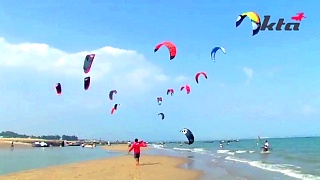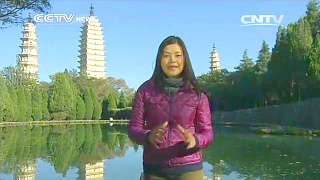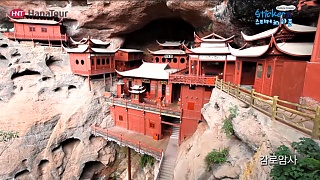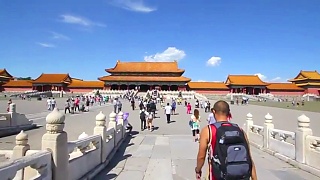With CGTN Travelogue ...
[640],shadow=true,start=,stop=With Blondie in China ...
Xiamen Visitor Guide
Introduction
Xiamen, a coastal city in Fujian Province, is known for its scenic views, rich history, and vibrant cultural scene. With its mix of modern urban life and traditional charm, Xiamen offers visitors an unforgettable experience. This guide will provide you with all the essential information to explore Xiamen's beautiful beaches, historic sites, and delicious cuisine.
Key Attractions
1. Gulangyu Island
Gulangyu Island, a UNESCO World Heritage site, is just a short ferry ride from Xiamen's main city. Known for its colonial architecture, winding streets, and absence of vehicles, Gulangyu offers a peaceful retreat from the bustling city. Highlights include the Piano Museum, Sunlight Rock, and the Shuzhuang Garden.
2. Nanputuo Temple
Nanputuo Temple is one of the most famous Buddhist temples in China. Located at the foot of Wulaofeng (Five Old Men Peaks), the temple complex includes beautiful halls, statues, and a large lotus pond. Visitors can also hike up the mountain behind the temple for panoramic views of Xiamen.
3. Xiamen University
Xiamen University is often considered one of the most beautiful campuses in China. Visitors can explore its lush grounds, see the historic buildings, and walk around the tranquil Furong Lake. The university is located near Nanputuo Temple, making it convenient to visit both in one trip.
4. Zhongshan Road Pedestrian Street
Zhongshan Road is a bustling pedestrian street filled with shops, street food vendors, and historic buildings. It's a great place to experience local life, shop for souvenirs, and taste Xiamen's famous snacks, such as peanut soup and oyster omelets.
5. Hulishan Fortress
This coastal defense fortress was built in the late 19th century during the Qing Dynasty. The site includes ancient cannons, barracks, and a small museum detailing Xiamen's military history. Hulishan Fortress offers insights into China's coastal defense history and provides scenic views of the ocean.
Cultural Activities
Xiamen is a city rich in culture and tradition. Here are some activities to help you experience the local culture:
- Tea Tasting: Fujian Province is famous for its tea, and Xiamen is a great place to taste high-quality oolong tea. Visit a local tea house or the Xiamen Tea Culture Museum to learn about the tea-making process and enjoy a traditional tea ceremony.
- Temple Visits: In addition to Nanputuo Temple, explore other local temples such as the Hongshan Temple and the Tianhou Temple, dedicated to the goddess of the sea, Mazu.
- Attend a Minnan Opera Performance: Minnan opera, also known as Hokkien opera, is a traditional form of Chinese opera popular in Fujian. Catch a performance to experience this unique cultural expression.
- Explore Local Markets: Visit markets like the Eighth Market (Ba Jiao Ting Market) to see local produce, seafood, and traditional foods. It's a great way to experience the local lifestyle and cuisine.
Dining Options
Xiamen is a paradise for food lovers, offering a wide range of local dishes and seafood delicacies. Here are some must-try dining experiences:
- Seafood: Being a coastal city, Xiamen boasts fresh seafood dishes. Try local specialties like sandworm jelly, steamed mantis shrimp, and crab porridge.
- Shacha Noodles: This famous noodle dish is made with a unique peanut-based shacha sauce, pork, and various vegetables. It is a staple of Xiamen's street food scene.
- Spring Rolls: Xiamen-style spring rolls are a popular snack. They are filled with a mix of vegetables, meat, and sometimes seafood, wrapped in thin dough and fried to a crispy perfection.
- Local Snacks: Don't miss out on trying local snacks like peanut soup, oyster omelet, and rice dumplings (zongzi). You can find these at street food stalls and markets.
- Dim Sum: For a more formal dining experience, visit a local dim sum restaurant to enjoy a variety of steamed buns, dumplings, and other small dishes.
Shopping
Xiamen offers a wide range of shopping experiences, from modern malls to traditional markets:
- SM City Xiamen: This large shopping mall is one of the most popular in Xiamen, offering international brands, local shops, and a variety of dining options.
- Zhongshan Road: A pedestrian street known for its local boutiques, souvenir shops, and street food. It's a great place to buy local crafts, tea, and snacks.
- Shapowei Art Zone: A trendy area with art galleries, coffee shops, and boutique stores. It's an excellent spot for unique gifts and handmade items.
- Wuyuanwan Wetland Park Market: Visit this market for fresh produce, local snacks, and handmade goods. It's a perfect spot for those looking to experience local life and purchase fresh food.
Practical Tips for Visitors
- Best Time to Visit: The best time to visit Xiamen is from October to December when the weather is pleasant, and the skies are clear. Spring (March to May) is also a good time, with mild temperatures and blooming flowers.
- Getting Around: Xiamen is well-connected by public transportation, including buses, taxis, and a metro system. Biking is also a popular way to explore the city, especially along the scenic coastline.
- Language: Mandarin is the primary language spoken in Xiamen, though many people understand basic English, especially in tourist areas. Learning a few basic Mandarin phrases or using a translation app can be helpful.
- Currency: The local currency is the Chinese Yuan (CNY). Most shops and restaurants accept credit cards, but it's a good idea to carry some cash, especially when shopping at local markets and street vendors.
- Respect Local Customs: Xiamen is a culturally rich city with many religious sites. Be respectful when visiting temples and other religious places. Dress modestly, especially when entering temples, and follow any rules regarding photography.
- Safety: Xiamen is a relatively safe city for tourists. However, as with any travel destination, keep an eye on your belongings, especially in crowded areas and markets.

Related Videos
Featured Videos

|

|
|

|
Sky bars, hot springs and more ..
|

|
With Wei's Travel ...
|
 A guide to XiaMen, FuJian province
A guide to XiaMen, FuJian province






















